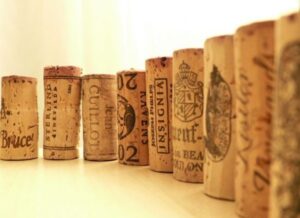So, Can You Compost Wine Corks?

Do you have an overabundance of wine corks hanging around? You haven’t wanted to toss them in the trash, but you weren’t exactly sure what to do with them, either. Now, you’re getting anxious because that pile of discarded corks is taking up a lot of room and well, it doesn’t actually bode well for when the in-laws visit. How to hide the boozey evidence beyond crafts? Can wine corks be composted?
Sure, you can turn those leftover wine corks into bath mats, bulletin boards, trivets, coasters, wreaths, even a chandelier—just check out Pinterest—but maybe you’re not feeling particularly crafty. In that case, you can actually compost wine corks. Cool, huh? But there’s a little bit more to it than just tossing them in that compost pile.
What kind of cork?
Before you go chucking your bowl… jar…TUB?…of wine corks into your compost pile, check to make sure all of your corks are made of organic cork. Increasingly, wine makers have been using synthetic corks—including plastic and silicone—to stop up their bottles. Synthetic, in my bottle of vino? Not very classy, huh?
Cork is still the material of choice in the wine industry for sealing bottles, even if you see more and more screw caps, plastic corks and (gah!) boxed wine on store shelves. True cork comes from oak cork trees primarily grown in forests in Spain, Portugal and the Mediterranean. The sustainable harvesting process strips the bark from the tree without harming it. The bark then grows back, like sheep’s’ wool. The trees typically have a life of 150 years, but the cork can only be harvested every 9-12 years. As a renewable resource you can feel just fine eco-wise about tossing your corks in the compost pile.
How to compost them
If you compost regularly, you know that in order to have a healthy pile of decaying matter, you need a half-and-half mixture of ‘browns’ and ‘greens’. Brown matter includes materials like dead leaves, branches and twigs. While green matter includes anything coming out of your kitchen. (Think coffee grounds and kitchen scraps. Grass clippings and weeds also count as greens.) Your discarded wine corks can serve as an additional layer of brown matter for your compost pile.
Don’t expect to simply drop your corks in the compost pile and hope they turn into soil. You’ll be waiting a long time. As an impermeable material, cork doesn’t allow liquids to pass through it. That makes it great for plugging up a bottle of vino, but not so easily suited to composting. You’ll need to grind up your cork into teeny pieces to help along the degrading process before adding it to your compost pile.
If you don’t have a compost pile (or don’t want to wait on them to degrade), you can also use your ground wine corks in the garden! Repurpose them as mulch around your plants to help lock in moisture on hot days. You can also use your minced cork in the bottom of planters, like you would rocks or pebbles, to help promote drainage.
Follow Kirsten on Twitter @kirsten_hudson, Google+ and Pinterest.
image: cbcastro

